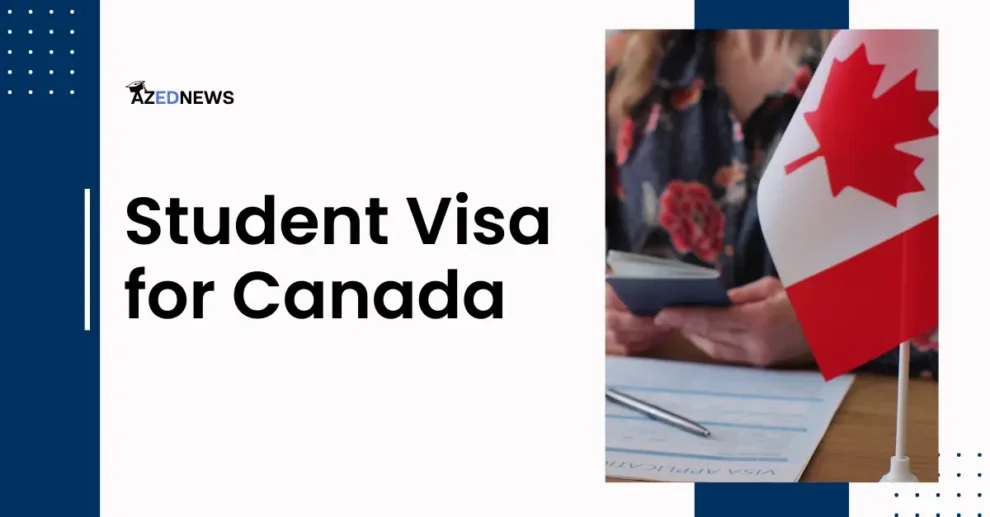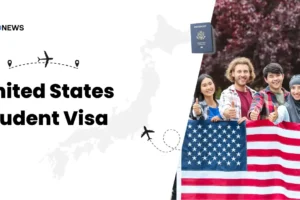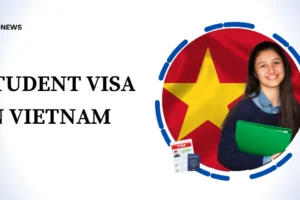If you are a student and planning to go to Canada, then you need a Student Visa for Canada. Canada, which is home to almost 500,000 international students, is renowned for providing globally recognized degrees at reasonable tuition costs and excellent educational opportunities. Increase it with a great standard of living, plenty of post-study employment, and immigration options.
Table of Contents
Students need a study permit to study in Canada. A study permit verifies your stay in Canada, whereas a student visa only permits admission. For an international student, it is a necessary immigration document.
An Electronic Travel Authorization (ETA) or guest visa must always be obtained in conjunction with your study permit. Please be aware that although an ETA or guest visa permits you to enter Canada, a study permit is a document that allows you to study there.
Key Takeaways:
- A student visa for Canada requires students to be accepted into a designated learning institution.
- Studying in Canada could be beneficial for students in various ways like exposing them to opportunities, allowing them to work while studying, etc.
- There are three intakes in Canada every year for international students.
- To be eligible for a student visa for Canada, students have to qualify as vaccinated travelers and should be accepted by DLI among so much more.
- The documents required for a student visa to Canada are a passport, proof of funds, and proof of acceptance.
- A student visa for Canada should be valid for about six months to five years. An extension is granted if necessary.
- The processing time for a Canada Student Visa is about 20 days.
- The cost of a Student Visa in Canada is usually about 150 CAD to 200 CAD on average.
What is a student visa for Canada?
A student visa is a document that international students need to study in Canada. Canadian immigration authorities issue it. International students are not permitted to study in Canada without a valid study permit.
In addition, students can enroll in designated learning institutions with a study visa. An educational establishment that has been permitted by a province or territory government to accept international students is known as a designated learning institution (DLI).
What are the benefits of studying in Canada?
Canada is one of the most developed countries in the world. It has become one of the most preferred study locations in the last few years.
Additionally, some of the best universities from the QS worldwide rankings are present in Canada. Some of the top benefits of studying in Canada are:
- Affordable tuition fees for most students
- Quality curriculum for courses
- Innovative training and research opportunities
- Best possibilities for immigration
- International Exposure
- International students can work while studying.
What are the intakes in Canada?
The universities in Canada have around 3 intakes every year. They are:
- Fall intake which happens in September
- Winter intake which happens in January
- Summer intake which happens in April or May
What are the eligibility criteria for a student visa for Canada?
To be eligible for a student visa to Canada, students have to fulfill the following requirements:
- They should qualify as a fully vaccinated traveler. The students are expected to submit certain proofs of their vaccinations.
- Students should be accepted by the designated learning institute or DLI
- Students should have proof of adequate funds for tuition fees, living expenses, and return transport for themselves and their family members if they are accompanying them.
- Students should submit proof of having a clean background without any criminal record. Usually, a police verification certificate for this should be sufficient.
- Students should send proofs of medical certificates which showcase their good health.
What are the documents required for a Student Visa for Canada?
As soon as you receive your college admission letter, you should apply for a Study Permit in Canada.
If you want to apply for the September intake, you should start the visa application procedure in June. The following paperwork is required to apply for a student visa to Canada.
1. Valid passport:
To apply for a study permit, candidates seeking a Canada study visa must have a valid passport. According to the Canadian High Commission, you need a passport that is good for the duration of your anticipated stay in Canada.
For example, your passport should be valid until at least September 2026 if you intend to travel to Canada in September 2024 for a two-year course.
2. Proof of acceptance by a designated learning institution:
The acceptance letter from the college or other institution you intend to attend is required. A university that has the Immigration Department’s recognition is known as a Designated Learning Institute.
If you are applying to the province of Quebec, a CAQ, or Québec Acceptance Certificate, is also required. The government of Quebec is the one issuing it. The CAQ application details will be sent to you by your college or institution. But you don’t need a CAQ if your studies last fewer than six months.
3. Proof of funds:
When you apply for a study permit, you will need to provide evidence of your financial situation. By today’s standards, you would need to demonstrate that you would have the money to cover both our tuition and living expenses.
According to Canadian Immigration, a student needs at least CAD 20,635 for each year they plan to be there. In addition to the first two, the student would also need to demonstrate that they had sufficient money for a return trip. These tools can be used to demonstrate funds:
- Canadian bank account
- Guaranteed investment certificate from the participating Canadian financial institute.
- A student loan or an education loan.
- Bank statements for the last 4 months
- A bank draft
- Proof of paid tuition and housing fee
- Letter from the school that has provided the funds
Whether you remain in Quebec or outside of it determines the minimum bank balance required for a student visa to Canada. Furthermore, it is contingent upon the number of individuals traveling with you while in Canada.
Minimum bank balance for Canada Student visa (Outside Quebec):
| Person | Funds Required Annually (excluding tuition fee) – Outside Quebec |
| Primary applicant | CAD 10,000 |
| First family member | CAD 4,000 |
| Every additional member | CAD 3,000 |
Minimum bank balance for Canada Student Visa (Inside Quebec):
| Person | Funds Required Annually (excluding tuition fee) – In Quebec |
| 1 person (under 18 years) | CAD 6,569 |
| 1 person (18 years or above) | CAD 13,134 |
| 2 persons (18 years or above) | CAD 19,264 |
| 2 persons (18 years or above) 1 person (under 18 years) | CAD 21,579 |
| 2 persons (18 years or above) 2 persons (under 18 years) | CAD 23,290 |
4. Passport size photographs:
Should you choose to submit your application offline, you will require two passport-sized photos that meet the specified requirements.
You need to obtain a digital copy of the photo, no larger than 4 MB, for an online application. Standard neutral facial expressions, a plain background, and the absence of headgear (unless worn for religious purposes) are further prerequisites.
- The image must be at least 35 mm by 45 mm in size.
- The photo needs to be current—no more than six months old.
- Each picture needs to have your name and birthdate put on the reverse.
5. IELTS score:
We strongly advise that you take the English Language Proficiency Test and obtain your score before beginning the visa application process, even if it is not required at the time of application.
As it is, to verify your acceptance to the Canadian University, you would have needed to submit your English language competence score. It is acceptable to use the TOEFL, IELTS, etc.
6. Statement of purpose:
Another name for this is a Letter of Explanation. You would need to send in an essay explaining why you are visiting Canada and that you are aware of your obligations as a student to apply for a Canadian study permit. Although the checklist will ask for it as an optional item, we highly advise you to submit it.
What is the application process for a Student Canada Visa?
There are four stages of receiving a Canadian student visa. They are:
1. Check the eligibility:
Ensure that you are qualified for a study permit in Canada. Depending on your citizenship and place of residence, you may also need a variety of other documentation in addition to an acceptance letter from a DLI and evidence of financial support.
2. Prepare the application:
When you are eligible, you can start preparing your application for a study permit. Make sure you have acquired all the documentation needed in your nation. Immigration authorities have the authority to reject study permits to applicants who they believe do not fulfill all conditions, thus it is important to have an experienced immigration representative check your application before submitting it.
3. Submitting the study permit application:
When submitting your application, you have two choices:
- Apply online:
By registering on the Immigration, Refugees, and Citizenship Canada (IRCC) website, you can electronically apply with scanned or electronic copies of your supporting documentation.
- Apply via paper:
Put together your application in hard copy and send it to the National Visa Application Center (VAC).
4. Come to Canada if your study permission is granted:
Please be aware that until you reach a Canadian Port of Entry (POE), you will not acquire your study permission for Canada. The Canadian government will provide you with a Port of Entry Introduction Letter if your permit is accepted. To get your study permit in Canada, you must save this letter and present it to the immigration officer when you arrive.
What is the validity of a Student visa for Canada?
The validity of a Canadian student visa varies based on the length of the course, from six months to five years. If necessary, an extension may be granted, and applications for such a visa may be submitted even from the student’s home country.
What is the processing time for a student visa for Canada?
Processing time is the amount of time the CIC needs to complete an application for a student visa. The application process begins and ends on the day of the final decision.
The average processing period for a student visa to Canada is six weeks. Through their MyCIC accounts, applicants (both online and on paper) can check the status of their applications.
In addition, students applying via the SDS pathway should allow 20 calendar days for the processing of their Canada student visa following biometrics.
Post-study work permits for international students in Canada:
For international students who wish to remain and work after graduation, Canada provides possibilities for work permits. There are various part-time jobs for international students in Canada.
Through the Postgraduate Work Permit (PGWP) program run by Immigration, Refugees and Citizenship Canada (IRCC), foreign graduates can work in Canada for a maximum of three years.
- International students can work directly for any Canadian business in any industry under the PGWP program.
- You can work for the comparable course term under the PGWP program if you completed any course that lasted less than two years.
- A three-year post-study work visa will be granted to you if the course lasts two years or longer.
What is the cost of a Student Visa for Canada?
According to Citizenship and Immigration Canada, the student visa for Canada fee could range from 150 CAD to 200 CAD.
| Application (per person) | CAD |
| Study permit (including applications for extensions) | 150 |
| Biometrics fee (per person) | 85 |
What are the factors which affect student visas for Canada?
The processing time for a student visa to Canada is measured from the moment the application is received by the visa approval authority.
Processing time for a Canada student visa might be affected by a few things. Below is a list of them:
- Type of application that is sent to the relevant authorities
- Any insufficient details or proof of the required paperwork
- The number of applications that the visa authorities have approved
- Because of the candidate’s criminal history, authorities may decide to deny the student visa application or extend the processing period.
- If the nation issues any travel restrictions
- Shifts in political power
What are the top universities in Canada for international students?
| Serial No. | Global Rank | University |
| #26 | University of Toronto | |
| #27 | McGill University | |
| #46 | University of British Columbia | |
| #111 | Université de Montréal | |
| #126 | University of Alberta | |
| #140 | McMaster University | |
| #149 | University of Waterloo | |
| #170 | Western University | |
| #230 | University of Ottawa | |
| #235 | University of Calgary |
Scholarships for international students in Canada:
Some of the best scholarships for international students in Canada are:
| Scholarship Name | Amount (per year) |
| BrokerFish International student scholarship | 1000 CAD |
| Vanier Canada Graduate Scholarships | 50,000 CAD |
| Lester B. Pearson International Scholarship Program | 82,392 CAD |
| Microsoft Scholarships | 12,000 CAD |
| The University of Calgary International Entrance Scholarship | 20,000 CAD |
Cost of studying in Canada for international students:
Tuition, living expenses, immigration fees, and other costs are all part of studying in Canada. The average cost of living in Canada for diploma, graduate, postgraduate, and master’s programs is shown in the following table.
| Higher Study Options | Average Tuition Fee per Year | Visa Fee | Living Expenses for 1 Year/Proof of funds for one year |
| Undergraduate Diploma & Advanced Diploma | 13,000 CAD and above | 150 CAD | 20,635 CAD |
| Advanced Diploma | 13,000 CAD and above | 150 CAD | 20,635 CAD |
| Bachelors | 13,000 CAD and above | 150 CAD | 20,635 CAD |
| PG Diploma/Graduation Certificate | 13,000 CAD and above | 150 CAD | 20,635 CAD |
| Masters (MS/MBA) | 17,000 CAD and above | 150 CAD | 20,635 CAD |
Frequently Asked Questions:
1. What are the requirements for a Canada student visa?
– Students should be enrolled at DLI.
– Students should also prove that they have enough money to pay for their tuition fees and living costs.
– Students should not have any criminal record and get a police certificate.
– Students should be in good health and undergo a medical examination.
– Students should prove to an officer that they will leave Canada when their student permit expires.
2. What is the minimum bank balance for a student visa in Canada?
Aside from the GIC, the minimum amount needed was CAD 10,000 annually. Except for the first year’s tuition price, this cost has raised to CAD 20,635 per year beginning of January 1, 2024.
3. Do students need IELTS for a Canada Student Visa?
Immigration, Refugees and Citizenship Canada (IRCC) accepts its assessment of the immigrant’s level of English ability. You must have an IELTS score to be eligible for a student visa to Canada if you intend to apply to undergraduate or graduate programs.
4. What is the age limit for studying in Canada?
International students can only be 18–35 years old in Canada; if they are coming through International Experience Canada (IEC), they may be able to be 18–29 or 30 years old. While there isn’t an age restriction on studying in Canada, there is one for IEC.
5. How many bands are needed for a Canada Student Visa?
A minimum of 6.0 bands in each module and a total band score of 6 are needed to obtain a Canadian student visa.
Conclusion:
There are several options available in Canada for students looking to further their professions. International students are coming to Canada to pursue graduate and postgraduate courses in a wide range of subject areas.
The nation is a great place to study since it offers top-notch instruction, well-regarded universities, cutting-edge facilities, a simple admissions process, reasonable tuition costs, and international recognition. After graduating, students are free to work and settle in Canada.












Add Comment